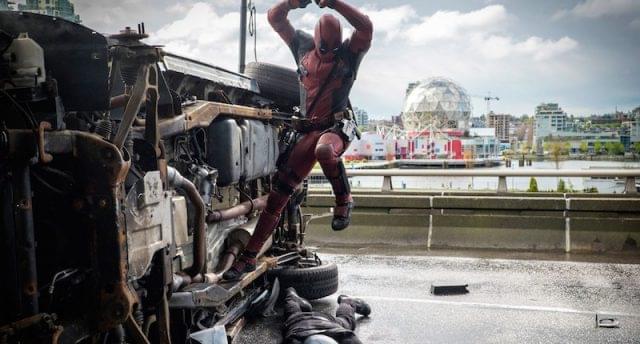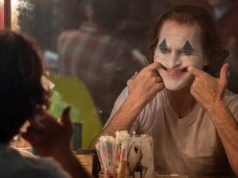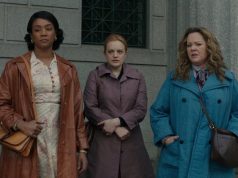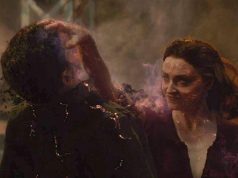
As I understand it from watching the movie, what separates Deadpool from other comic book superheroes is that he doesn’t want to be a hero; he knows he’s in a comic book; he’s willing — nay, eager — to kill bad guys; and he swears a lot.
The “Deadpool” movie conveys these differences, often to hilarious effect. Ryan Reynolds, who played a tamer version of the character for a couple of scenes in “X-Men Origins: Wolverine,” is the perfect choice for a sarcastic, potty-mouthed superhuman, and he revels in the freedom permitted him here. The script (by “Zombieland” writers Rhett Reese and Paul Wernick) is packed with gleeful taboo-busting, including snarky put-downs of other Marvel characters (the ones in the X-Men cinematic universe, anyway). First-time feature director Tim Miller plays along with an opening credit sequence that mocks opening credit sequences, giving descriptions (“God’s perfect idiot”; “a gratuitous cameo”) instead of people’s names.
Yet for all its aesthetic differences, this is ultimately just another superhero origin story — an example the formula, not a subversion of it. The body count isn’t any higher than in any comic book movie; the deaths are just more graphic. Deadpool breaks the fourth wall … but he also points out that he’s breaking the fourth wall, which kind of ruins it. He cracks wise about other superheroes … but only the ones that his film’s studio (20th Century Fox) has the movie rights to. For the most part, funny and zippy though it is, “Deadpool” is the safe, studio-sanctioned version of “edgy.”
We begin with Deadpool already in high gear, wearing a mask and costume while shooting, slicing, and decapitating villains before pausing the action so he can fill us in. He used to be Wade Wilson, a military assassin turned mercenary, a self-described bad guy who hurts worse guys. He also used to be quite the promiscuous slut, before settling down with strip-club waitress Vanessa (Morena Baccarin), whose sense of humor is as twisted as Wade’s. (They bond by one-upping each other’s stories of childhood abuse.)
“X-Men” (2000) B
“X2: X-Men United” (2003) B+
“X-Men: The Last Stand” (2006) B-
“X-Men Origins: Wolverine” (2009) C+
“X-Men: First Class” (2011) A-
“The Wolverine” (2013) C+
“X-Men: Days of Future Past” (2014) B
“Deadpool” (2016) B
“X-Men: Apocalypse” (2016) C+
“Logan” (2017) B
Then Wade got cancer, tried an experimental treatment suggested by a clearly untrustworthy psychopathic mutant named Ajax (Ed Skrein), and ended up the way he is now: very strong, basically immortal, able to regenerate lost or damaged parts of his body, but ghastly in appearance (hence the mask). He’s looking for vengeance against Ajax, and he’s killing anybody who gets in his way. He’s cheerful in his work, though, always ready with a joke. You appreciate that in a revenge-minded murderer.
Meanwhile, the X-Men keep trying to recruit Deadpool, or at least make him tone down the bloodbaths. And by “X-Men,” I don’t mean Wolverine or Professor X or anybody like that, but a couple of third-tier mutants named Colossus (Stefan Kapicic) and Negasonic Teenage Warhead (Brianna Hildebrand). Getting Hugh Jackman or Patrick Stewart or whoever to play the top-shelf X-Men would have been prohibitively expensive, of course. But Deadpool makes a joke about this, so I guess it’s OK?
This is a rude, raucous action comedy, even more focused on laughs (as opposed to world-building) than “Ant-Man” was. There are bracingly funny side characters like Weasel (T.J. Miller), Deadpool’s bartender friend, and Blind Al (Leslie Uggams), an old woman who shares Deadpool’s apartment with him and apparently has a thing for cocaine. But many of the pop-culture references and jokes are perilously of-the-moment, dooming the film to a short shelf life. (Two years from now, when you re-watch it to refresh your memory before the sequel, you’ll think, “Yikes, this is dated.”) It’s a welcome new flavor in the superhero movie stew, but it’s still floating in the same pot as the rest of them.
B (1 hr., 48 min.; )





